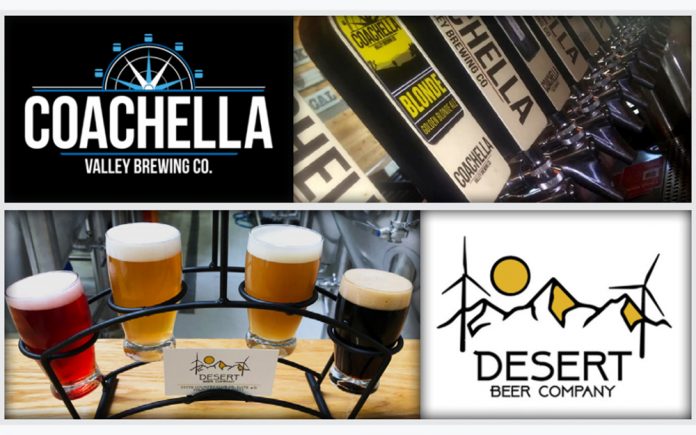
By Aaron Ramson
It’s been over a year since shocking worldwide events forced billions of people to rethink their lives, and millions of businesses to rethink their strategies. Within a few short weeks, entire industries were forced to a grinding halt, chief among the casualties were entertainment, and food-and-beverage based businesses. The American craft beer market, heavily reliant on keg sales and taproom business, found itself unable to generate income in the way traditionally relied upon. The covid-19 pandemic came in waves, drowning many breweries who couldn’t stay afloat, while the resilient learned that there are more than a few ways to swim.
The Coachella Valley brewing scene was still growing in strides when the California business lockdowns were enforced in March of 2020. Desert Beer Company was a small start-up, just connecting with a growing fanbase, while the Coachella Valley Brewing Company had established itself as a venue catering to the desert’s eclectic music and arts scene, regularly showcasing live bands in parking lot concerts. Shuttered for a year and closed off to the public, Riverside country allowed patrons to buy packaged beer to-go, and little else. Both breweries were forced to rethink their strategies, and had to do so quickly.
Wes Gainey and Devon Sanchez were two individuals responsible for keeping these breweries operating during the pandemic, Wes with Coachella Valley Brewing, and Devon with Desert Beer Company. Managing a craft brewery can be challenging even in the best of times, but the pandemic and ensuing lockdowns forced even greater, and unexpected obstacles their way. A problem facing all businesses over the past year was staffing, and local breweries were no exception. “Running a skeleton crew with minimal hours for the taproom and the brewery spread us really thin,” says Wes Gainey. Devon Sanchez faced the same problems at his brewery, admitting, “I had to take on a bigger role in the brewing department while balancing taproom duties, as well as management/ownership responsibilities.” Reduced revenue forced many small businesses to furlough part of their staff, leaving fewer individuals to do the work once shared by many. Wes credits Coachella Valley Brewing Company’s survival to Head Brewer Eric Beaton, who often single-handedly had to produce all of the beer that the company is so lauded for. Over at Desert Beer, Devon Sanchez relied on family and close friends to help him complete all of the daily tasks needed to stay afloat.
While the past 12 months have been grim reminders of how fragile society can be, there were more than often reminders of how strong communities are. Desert Beer Company learned firsthand how supportive the community can be, with customers often buying multiple beers to-go, paying for growler deliveries, and many tipping well over standard tipping fare. Club members often refused their discount pricing, instead asking to be charged full price in an effort to provide the business with more income. “I am very thankful for my loyal friends and customers,” beams Devon.
A well-known proverb states that necessity is the mother of invention, meaning that trying times can often be the source of inspiration. With their response to the business lockdowns, the Coachella Valley Brewing Company proved this to be an absolute truth. When asked how the brewery dealt with the taproom closing, Wes Gainey states “We knew people everywhere still wanted their beer, so we created new flavors and came up with inventive can designs to get on the shelves in the grocery, liquor, corner stores and bottle shops.” No longer able to rely on keg sales of their product, the Coachella Valley Brewing Company refocused their attention on smaller packaging, and the companies can designs have come to reflect the artistic and creative nature of the brewery. Featuring a wide palate of flavors from oatmeal mocha stouts to coconut, guanabana, guava and passionfruit double IPAs, CVBs cans are as visually appealing as they are boldly flavored.
With the community behind them and innovation on their side, both Devon and Wes are optimistic for the future of their respective breweries. Wes projects, “We anticipate an initial influx once things get back to normal, then a balancing. People are hankering to get out and try new things, hell, to try anything.” Devon agrees, saying “I remain hopeful that we can return to normalcy this year. I want to bring more business in with music venues and food options, but making sure not to overburden capacities during this sensitive health recovery.” While the valley slowly recovers from the effects of the past year, there is hope that people can once again gather and revel without fear of sickness and transmission. It will take time and patience, but confidence is growing that the worst is behind us. “We hope that the craft beer scene can thrive as a communal experience again,” says Wes, “because truthfully, the best beer is one that is shared with a friend.”










































